President Cyril Ramaphosa. (Photo supplied by GCIS)
Reflections on inaugural Black Industrialists Conference
A clarion call to accelerate economic transformation
More than 650 Black Industrialists (BIs) converged at the Sandton Convention Center on Wednesday last week to among other things reflect on achievements of the BI program and explore opportunities aimed at boosting entry of black-owned businesses and producers into the mainstream economy
The BIs were drawn from cross sections of the economy including Food and beverages, Furniture manufacturing Chemical production, Cosmetics and health-care products, Steelmakers, Mining companies and their industrial suppliers, Clothing and textiles, Filmmakers, Tourism, Innovation, and technology.
Delivering his keynote address to the conference, President Cyril Ramaphosa acknowledged the gains and contribution that black businesses were making towards economic growth and transformation. The President was also quick to acknowledge the shortcomings of the Black Industrialist program saying government was committed to ensuring the success of black-owned business. The conference also honoured various black owned businesses for their excellence, contribution to ingenuity and as well as transformation.
——————————————————————————————————————————————————————————————–
‘Resilient industrialists are creating jobs’
We have in our midst industrialists who have invested their money to build new factories, to expand mines, to develop more agricultural lands, to obtain machinery and to employ young South Africans.
 Ebrahim Patel, Minister of Trade, Industry and Competition
Ebrahim Patel, Minister of Trade, Industry and Competition
We have a large contingent of exporting firms present — last year, off the back of the commodity boom, South Africa achieved a record performance, exporting R1.8-trillion, representing almost one third of our GDP.
Some of the exports came from the black-owned firms present here today. We are now working with a black exporters’ network, to be launched today, to increase the volume of exports and create local jobs.
These are businesses that in many cases have shown resilience; and they are the productive engines that create jobs.
– Ebrahim Patel, Minister of Trade, Industry and Competition, addressing delegates at the BIEC conference
——————————————————————————————————————————————————————————————–
Huge strides in transformation but challenges remain
There is much to report back on the inaugural Black Industrialists and Exporters Conference (BIEC). In addition to the B2B opportunities the Conference facilitated, discussions on progress made thus far since the launch of the Black Industrialists (BIs) programme in 2015 and challenges facing black businesses in breaking into the mainstream economy were candid.
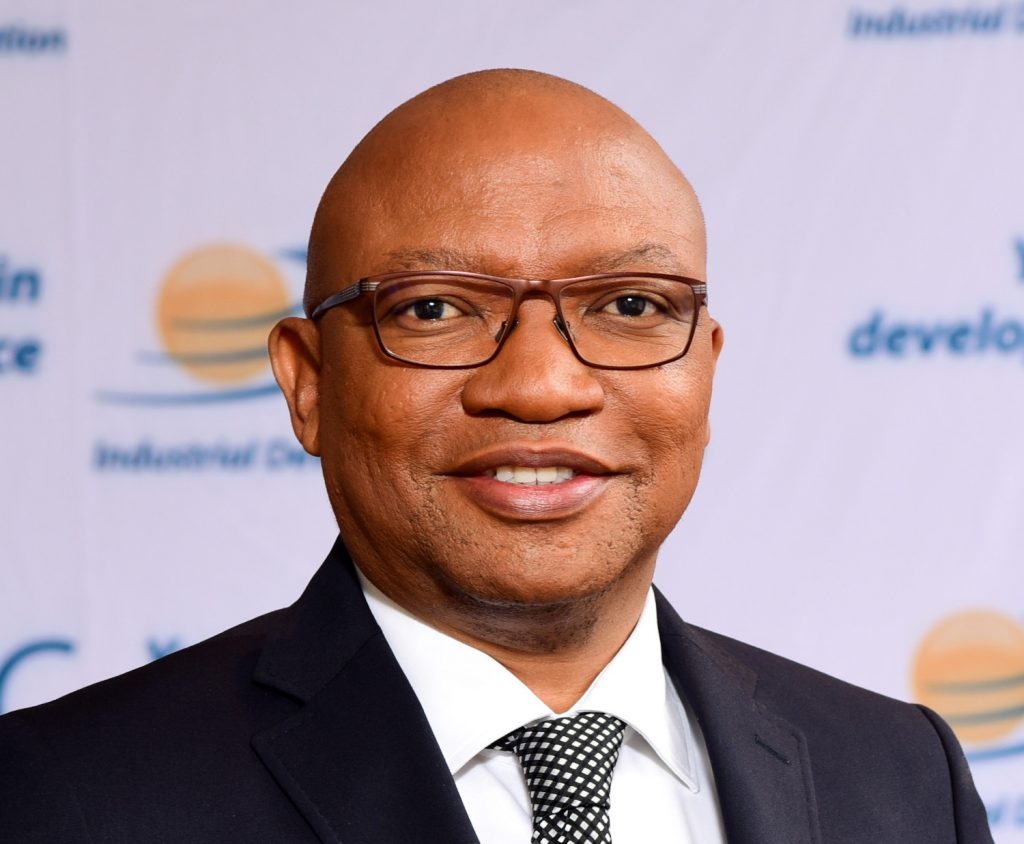 TP Nchocho, Chief Executive Officer of the Industrial Development Corporation
TP Nchocho, Chief Executive Officer of the Industrial Development Corporation
From successes scored thus far in transforming a skewed economy post the democratic dispensation to challenges facing black-owned enterprises in their quest to break into the mainstream economy, these discussions dominated the conference. Notably, the vastly transformed economic landscape is a far cry from the pre-democratic era.
Lest we forget, at the heart of the government’s drive to accelerate economic transformation, through the BI programme among others, is the acute need for black-owned businesses to play a greater role in helping address unemployment, poverty and inequality — the stubborn trifecta of challenges facing our country.
As the president alluded to in his keynote delivery, the number of black-owned formal businesses stood at 150 000 in 1994 and this figure has jumped two-fold, with nearly 300 000 black entrepreneurs today owning over half of all small businesses in the formal sector. Great as this feat is, the conference also laid bare some of the challenges facing BIs and black-owned businesses in general. The enormity of challenges that the economy has had to weather over the years has made bridging the economic divide even more difficult.
Lack of funding, lack of access to market opportunities and lack of a competitive landscape were just some of the factors identified as inhibiting the growth of black-owned businesses, but the fact remains that many firms have prospered since the inception of the BI programme, creating a large number of jobs and enabling these firms to export quality products across the globe.
At best this points to the result of a strategic intent to industrialise and transform the economy — factors attributable to the roles played by the Department of Trade, Industry and Competition (Dtic), the Industrial Development Corporation (IDC) and the National Empowerment Fund (NEF) among others. Over the last five years, the IDC alone approved R25-billion to support transactions for 328 black industrialists.
What next?
As a black entrepreneur, you may be wondering where the new business and growth opportunities will come from, and your despondency is understandable given the current challenging economic environment. Energy supply is erratic, threatening the viability of energy intensive businesses — small wonder that energy security was a constant concern emanating from discussions at the Conference.
That aside, the government’s economic blueprint — the Economic Reconstruction and Recovery Plan (ERRP) — has aptly scoped the terrain and pitched opportunities for black-owned businesses to play a critical role in reconstruction efforts. A notable attribute of the IDC going back to its inception has been its ability to identify and create new and future industries, and the economic shifts across the globe present us with opportunities to co-create new industrial pathways based on partnerships and investment flow.
As opposed to just a crisis we see greater opportunities in South Africa’s drive to ensure energy security. In particular, it is the Just Energy Transition (JET) — a transition towards sustainable, low-carbon and equitable energy systems — that has certainly created a window of opportunities for entrepreneurs looking to break into the renewable energy space.
IDC-funded projects thus far have ranged in size from utility-scale to smaller-scale distributed energy solutions, either for Own-Use by (predominantly) commercial and industrial sector companies or grid connected by Independent Power Producers (IPPs). As part of our funding activities, we have been able to facilitate black-empowered and youth-empowered companies to own and operate renewable energy projects.
Through our recent funding support to H1, a Black Economic Empowerment (BEE) group, we are now part of the creation of what is set to become one of the world’s largest hybrid solar PV and battery storage facilities. Of significance to the IDC, H1 — the consortium to which we provided funding — is the empowerment partner to Norwegian renewable energy manufacturer Scatec in the development of a solar PV and energy battery storage facility, which will be located in the Northern Cape. This investment is the latest in IDC’s continued support of BEE and community participation in IPP projects. To date, our exposure to renewable energy is north of R15.6-billion.
The BIEC celebrated black excellence by recognising a number of entrepreneurs during the course of the evening. One of the winners, Pele Green Investments, was recognised for its achievements in the green sector. Pele Green was a recipient of IDC funding in 2017 in support of its business objectives.
Another area of intense focus for the IDC is the hydrogen economy. As we know, hydrogen offers a credible solution to decarbonisation and replacing fossil fuels in a world that is anxious to mitigate climate change. Drawing on its experience and role in de-risking and helping to establish a renewable energy industry, the Corporation is poised to play a prominent role in developing the hydrogen economy, thus providing a great opportunity for black businesses looking to play a role in establishing this industry.
In addition, IDC and renewable energy outfit Bushveld Energy are pursuing a techno-economic evaluation of the viability to localise vanadium redox flow batteries, in response to the electricity generation challenges facing the country. This project — if it comes to fruition — will ensure localisation of renewable energy components and also foster a local battery energy storage industry.
As the IDC, we commit to continue to play a significant role in ensuring that we further elevate the achievements of black industrialists and support their businesses to play an ever-larger role in the South African, regional and global economy.
— TP Nchocho is CEO of the Industrial Development Corporation
——————————————————————————————————————————————————————————————–
NEF to maximise the national quest for inclusive economic growth
The recent inaugural Black Industrialist and Exporters’ Conference (BIEC) provided us the opportunity to reflect and showcase our contribution to the economic transformation imperatives that the National Empowerment Fund (NEF) has adopted.
 Philisiwe Mthethwa, Chief Executive Officer of the National Empowerment Fund
Philisiwe Mthethwa, Chief Executive Officer of the National Empowerment Fund
As an agency of the Department of Trade, Industry and Competition (the dtic), we are proud to report that the National Empowerment Fund (NEF) has since operational inception in 2005 approved 1 291 transactions worth more than R12.35 billion across the country with a total project value of R21.44 billion. Over R8.267 billion has been disbursed to these companies, supporting in excess of 112 905 of which 71 874 were new. In the previous financial year alone the NEF approved funding for transactions in excess of R1 billion, one of the most significant milestones in recent years, having supported 11 429 jobs and representing the highest during any single year, in recent years.
A mandate to transform the economy
While reflecting on these key milestones, the BIEC took place against the backdrop of a challenging economic environment. This challenge enjoins us to maximise our funding trajectory to help accelerate our mandate to transform the economy.
As outlined in the Economic Reconstruction and Recovery Plan “low levels of growth and challenges related to revenue leakages have also impacted negatively on resource mobilisation. These challenges, coupled with an increasing budget deficit and a rising stock of debt have constrained the fiscal space”.
These challenges have an impact on the cost of borrowing, more so on emerging black entrepreneurs. We remain committed to further lend our support to these entrepreneurs. Therefore, the BIEC could not have come about at a more opportune time when Government, its development finance agencies and social partners are determined more than ever before to pursue substantial structural change in the economy to unlock growth and allow for sustained development by breaking the stranglehold of inequality, unemployment and poverty.
Award-wining investments across key sectors
Accordingly, the NEF seeks to create an inclusive economy by increasing black participation in industrial development, increasing South Africa’s export-earning potential and reducing import dependency through co-investment and linkages with local and foreign investors. To date the NEF has invested approximately R900 million in 23 industrial projects, and 5 of these are operational businesses that have already created over 3600 jobs and leveraged over R4 billion in third-party funding.
Among these businesses are 4 investees that earned merit awards at the Presidential BIEC Awards for the Job Creator Award, the Young Black Industrialist Award and the Local Manufacturer Award. These are Mohlalefi Engineering in mining services, Khabokedi Waste Management, Tshellaine Holdings in property development and student accommodation, as well as BT Industrial, an exporter of a range of plastic-based products.
The greenfield projects that the NEF has developed hold out meaningful opportunity and potential for co-investment across various sectors of the economy including tourism, mineral beneficiation, agro-processing, renewable energy, business process outsourcing and infrastructure development.
Through financial and non-financial support, the NEF will continue to empower black entrepreneurs and industrialists across the key sectors of the economy to increase the tally of those how have received support, including businesses that manufacture and supply railway components, industrial steel wheels and rims, roof tiles, bricks, mining technology, furniture, pesticides, building panels, condoms and much more. Some have built state-of-the-art hospitals, affordable housing units, student accommodation complexes, community-owned shopping malls, office parks, hotels and lodges, placing the NEF and its investees at the heart of the nation’s commitment for redress, renewal, recovery and growth.
— Philisiwe Mthethwa, CEO of the National Empowerment Fund
——————————————————————————————————————————————————————————————–
MTN SA creates shared value by growing future-fit businesses, jobs across the supply chain
Creating shared value means making change happen where it matters — on the ground and in a real way so the people of South Africa benefit. It is about doing rather than talking and ensuring that the benefit of the modern digital economy assists more people, creates jobs and develops local opportunities.
 Charles Molapisi, MTN South Africa Chief Executive Officer
Charles Molapisi, MTN South Africa Chief Executive Officer
At MTN South Africa, we have embedded this thinking into our DNA because we know that without value creation through the various layers of our economy, sustainable growth, jobs and development will be little more than a pipe dream.
We see supplier development and building local capacity through skills development, as critical contributors to our shared future as South Africans. Our focus is firmly set on harnessing the immense benefits of the fourth industrial revolution so that people and businesses can reap new and exciting results.
This means ensuring more procurement channels are opened to increase the participation of SMMEs, Black-Owned Exempted Micro Enterprises (EMEs) and Qualified Small Enterprises (QSEs) in MTN’s value and supply chains. Aligned to this is developing and providing services and products ourselves, that add value, that create enterprises and promote sustainable growth.
B-BBEE, supplier development, and environment, social and governance (ESG) initiatives, are not to be viewed as onerous compliance exercises. The economic and societal benefits of operating our business in a way that both enhances our competitiveness and benefits while also growing the economy and societal benefits are immense, and the results speak for themselves.
To this end, MTN SA’s procurement spending with black-owned vendors increased from R3.5-billion in 2016 to R8.2-billion in 2021, with a strong focus on broadening the economic base to include more women. Our procurement spending with 30% black women-owned vendors grew from R9.2-billion in 2016 to R15-billion in 2021. A greater role by women in the economy will be critical if South Africa is going to overcome its jobs, skills, growth and community-development challenges.
There is, however, a decided lack of postgraduate career guidance and exposure for women who qualify in the science, technology, engineering and mathematics fields — only 23% of tech jobs in SA are held by women. Through our Foundation, we have launched the 2022 MTN Women in Digital Business challenge, which gives 10 less established women SMMEs the tools to succeed. They will get business, finance and mentorship support to remove the barriers currently hindering growth.
It is notable that on the whole our supplier development initiatives for 2021 well exceeded the target of 2% of net profit after tax (NPAT) at R97-million value, while the enterprise development (ED) contributions for 2021 was R129-million. Skills development spend for 2021 amounted to R229-million.
As we look ahead, we will build on these and other initiatives, while striving to do far more. Our focus is on retaining a Level 1 B-BBEE contributor status for both MTN SA and MTN Group, but with key strategic focus areas being skills development, and enterprise and supplier development (inclusive of preferential procurement).
Even though we have historically, and are currently implementing various initiatives, we do realise that more work still remains, and particular attention is being paid to increasing and creating meaningful opportunities for black-owned enterprises, youth-owned and black women-owned businesses to participate in the MTN SA’s supply and value chain.
One of the key pillars in our Ambition 2025 vision and strategy is our work to enhance ESG in what we do and in the communities we serve. This includes formulating and implementing empowerment strategies and policies that support the MTN Group Localisation and Financial Inclusion framework.
Our intention is to deliver a world-class enterprise and supplier development programme aimed at creating sustainable initiatives as an extension of our commitment to transformation and alignment to government’s efforts to accelerate the inclusion of black-owned business in the mainstream economy.
The ability to create shared value lies in all our hands. Our commitment at MTN SA is to meet the challenges of our time with hope, courage and an opportunity mindset. We will lead from where we are and seek to deliver true shared value to all the people of South Africa.
— Charles Molapisi, MTN SA CEO
——————————————————————————————————————————————————————————————–
Congratulations to the Black Industrialists Excellence Award Winners
Gloria Serobe wins Black Industrialist pioneer award
Founding Member and Executive Director of WIPHOLD and Chief Executive Officer of Wipcapital Gloria Serobe was awarded the Black Industrialist pioneer award by President Cyril Ramaphosa in recognition for her contribution to South Africa’s economic and social development.
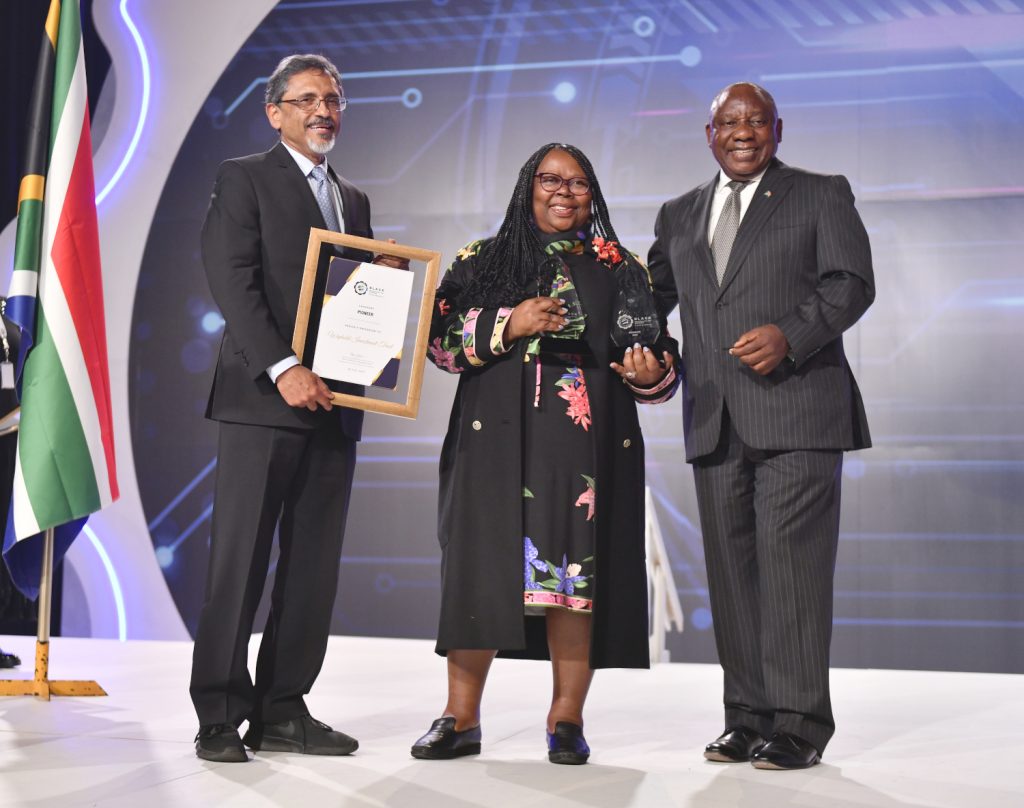 Minister Ebrahim Patel, Gloria Serobe and
President Cyril Ramaphosa, sharing a lighter moment after conferring her with the Black Industrialist pioneer award
Minister Ebrahim Patel, Gloria Serobe and
President Cyril Ramaphosa, sharing a lighter moment after conferring her with the Black Industrialist pioneer award
A business trailblazer of note, Serobe has won numerous awards including the Businesswomen Association’s Corporate Business Woman of the Year conferred to her in 2006.
She serves on several Boards including Old Mutual, Nedbank, Hans Merensky, Sasol Mining and Ixia Coal, and she is the Chairman of the Board of the Independent Ports Regulator. She is also an honorary member of the Actuarial Society of South Africa and is a member of SAICA’s Advisory Council.
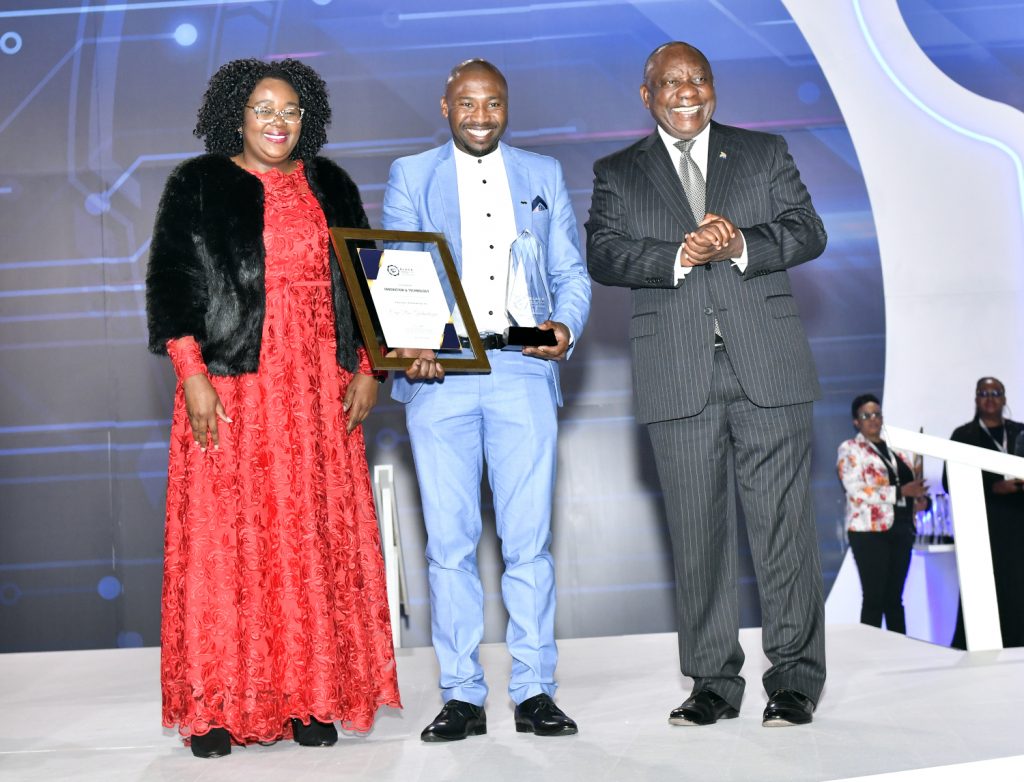 Best Innovator award -Capebio Technologies
Best Innovator award -Capebio Technologies
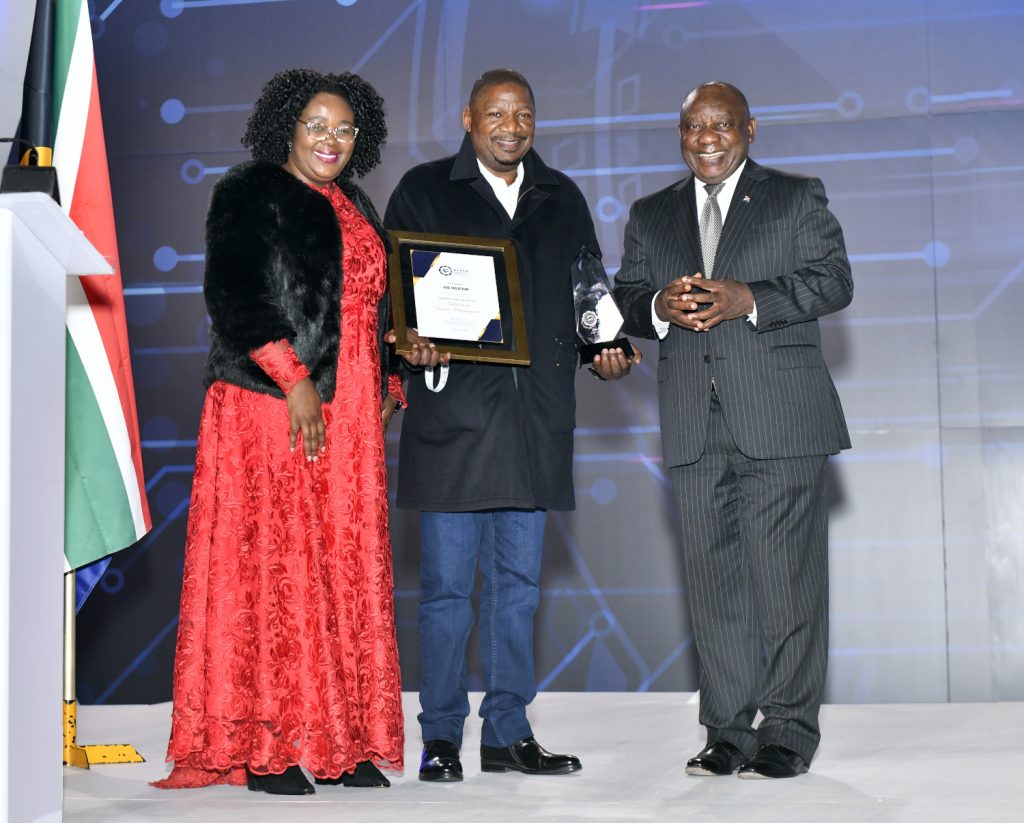 Job creation award – Khabo Kedi Waste management
Job creation award – Khabo Kedi Waste management
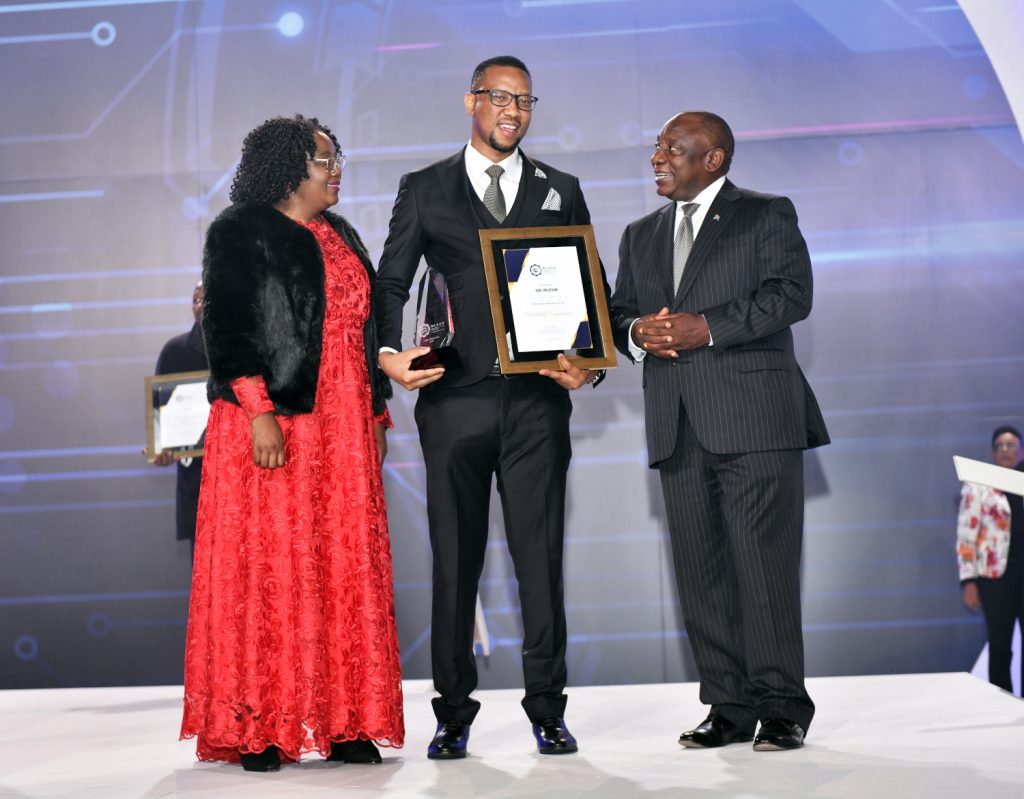 Job Creation Award – Mohlalefi Engineering
Job Creation Award – Mohlalefi Engineering
 Job Creation award – Tshelane Holdings
Job Creation award – Tshelane Holdings
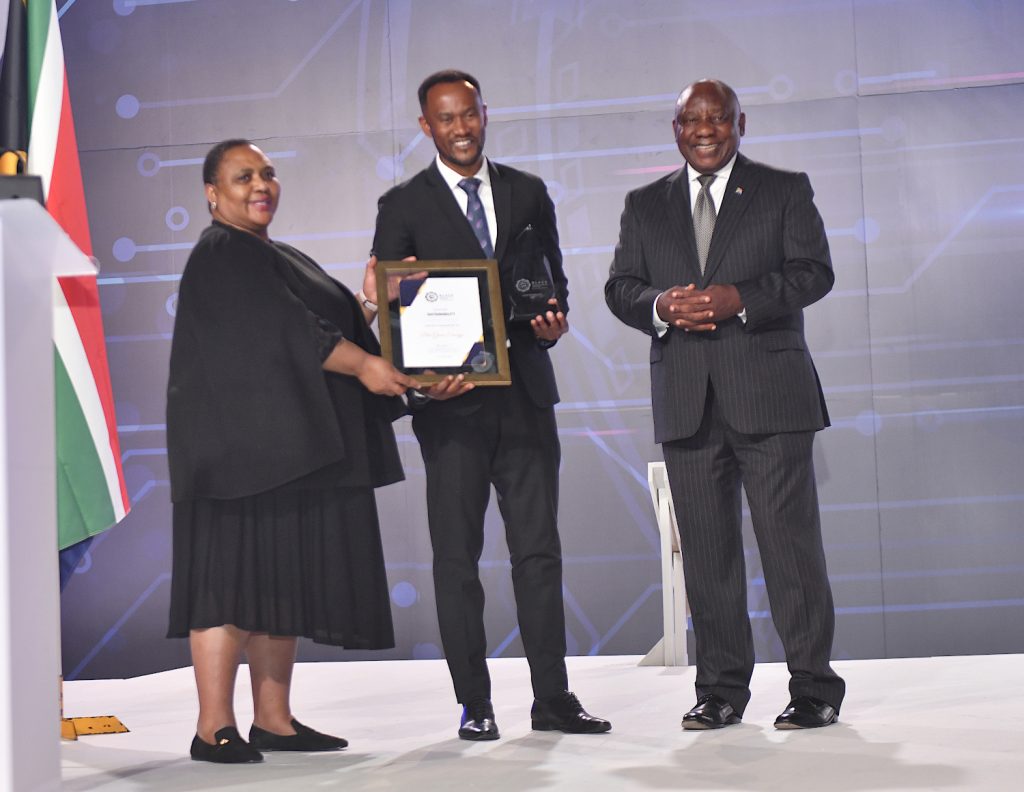 Sustainability award – Pele Green
Sustainability award – Pele Green
 Woman industrialist award – Lindiwe Sanitary pads
Woman industrialist award – Lindiwe Sanitary pads
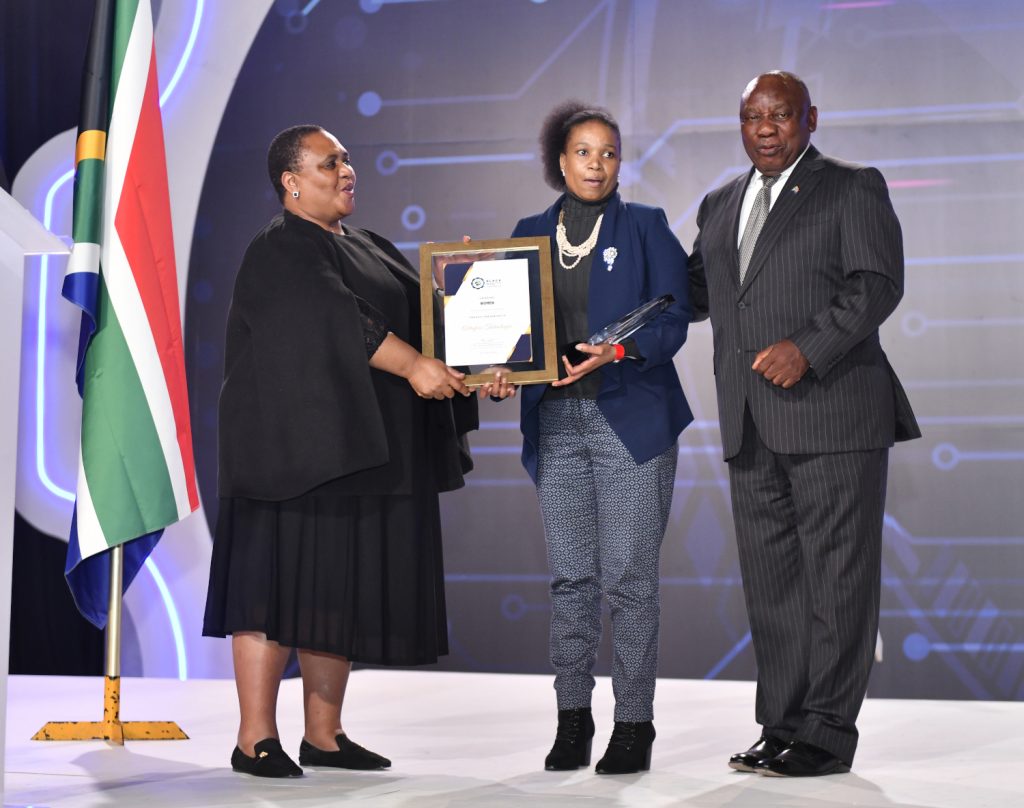 Woman industrialist award – Astrofica Technologies
Woman industrialist award – Astrofica Technologies
 Exporter award – Microfinish
Exporter award – Microfinish
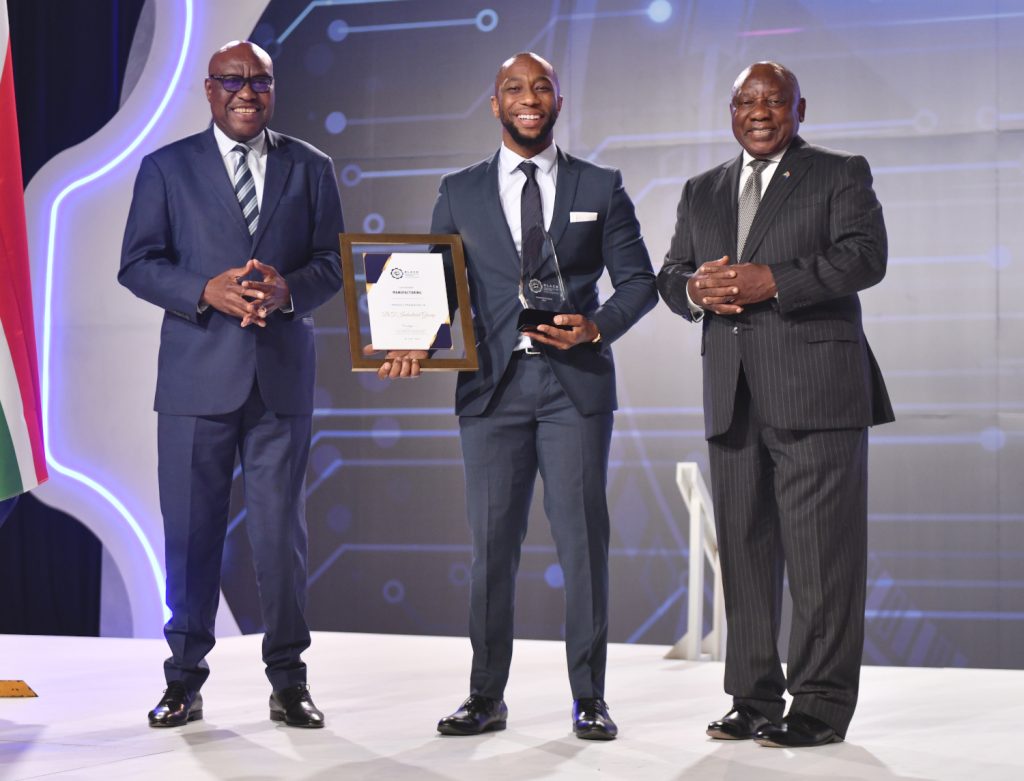 Local Manufacturer award – BT Industrial award
Local Manufacturer award – BT Industrial award